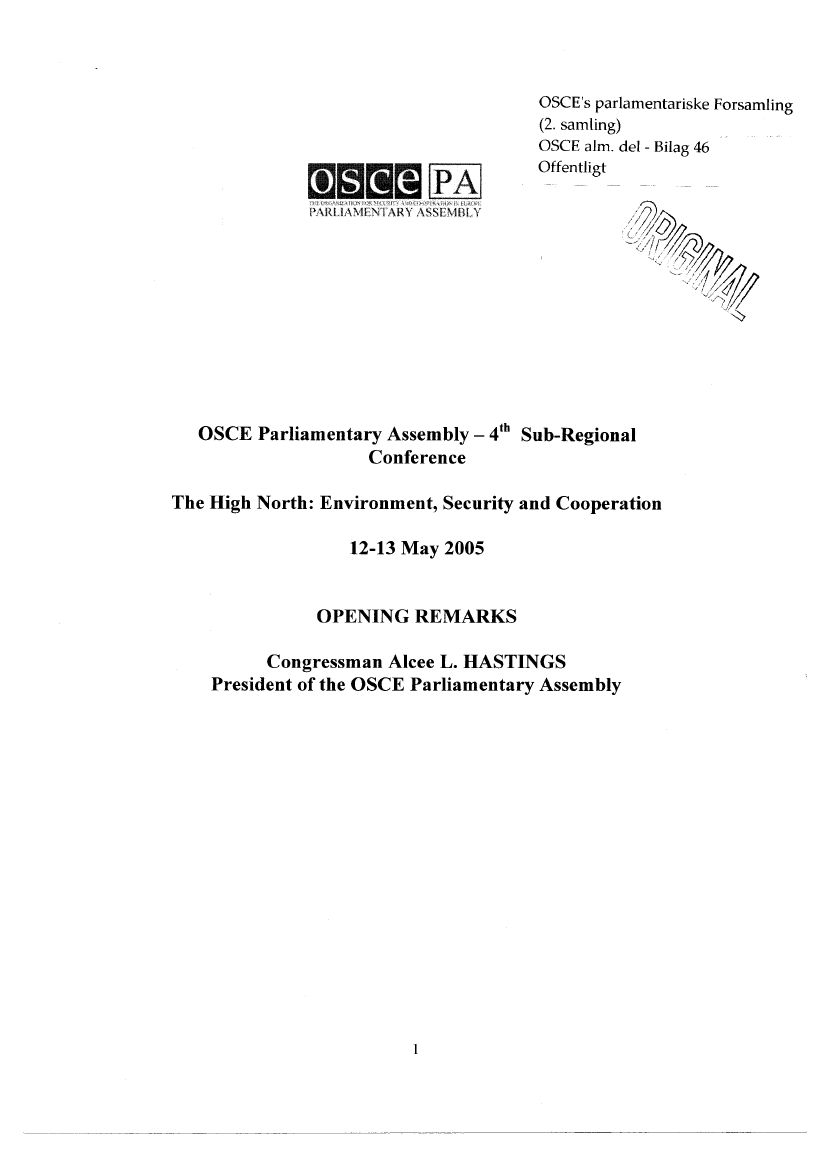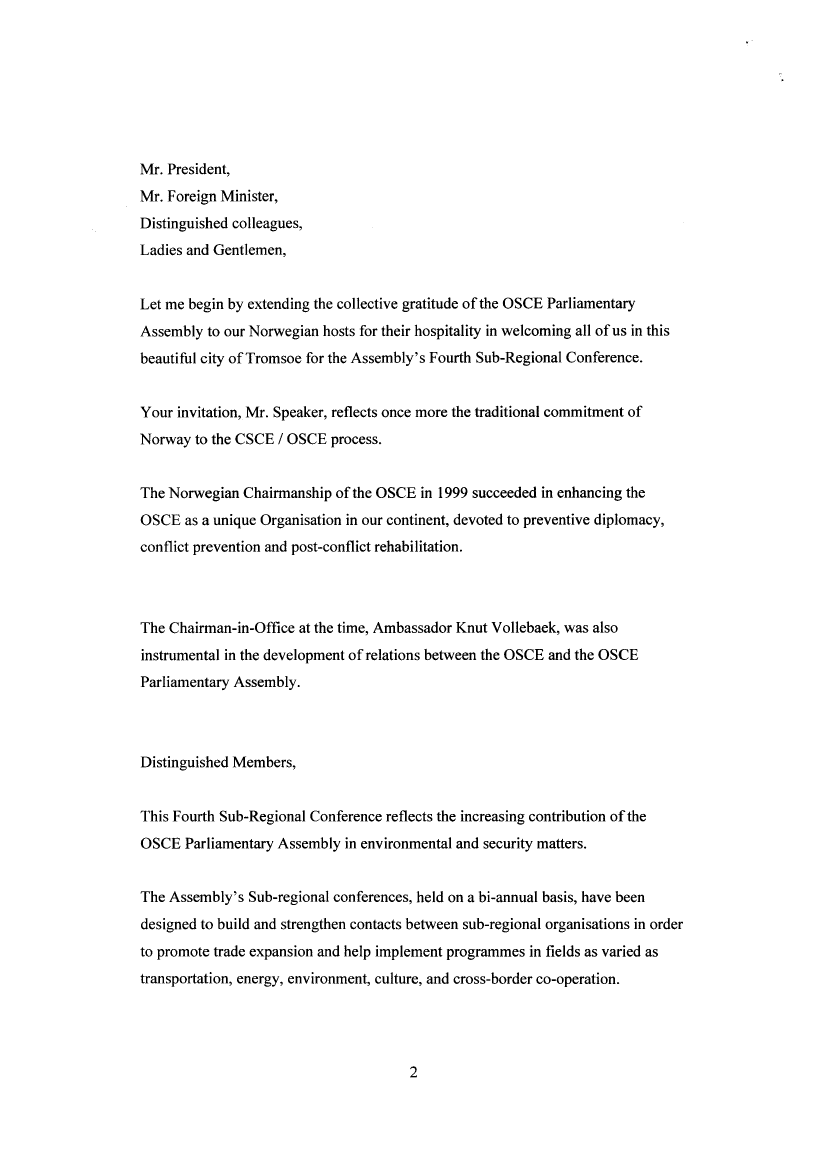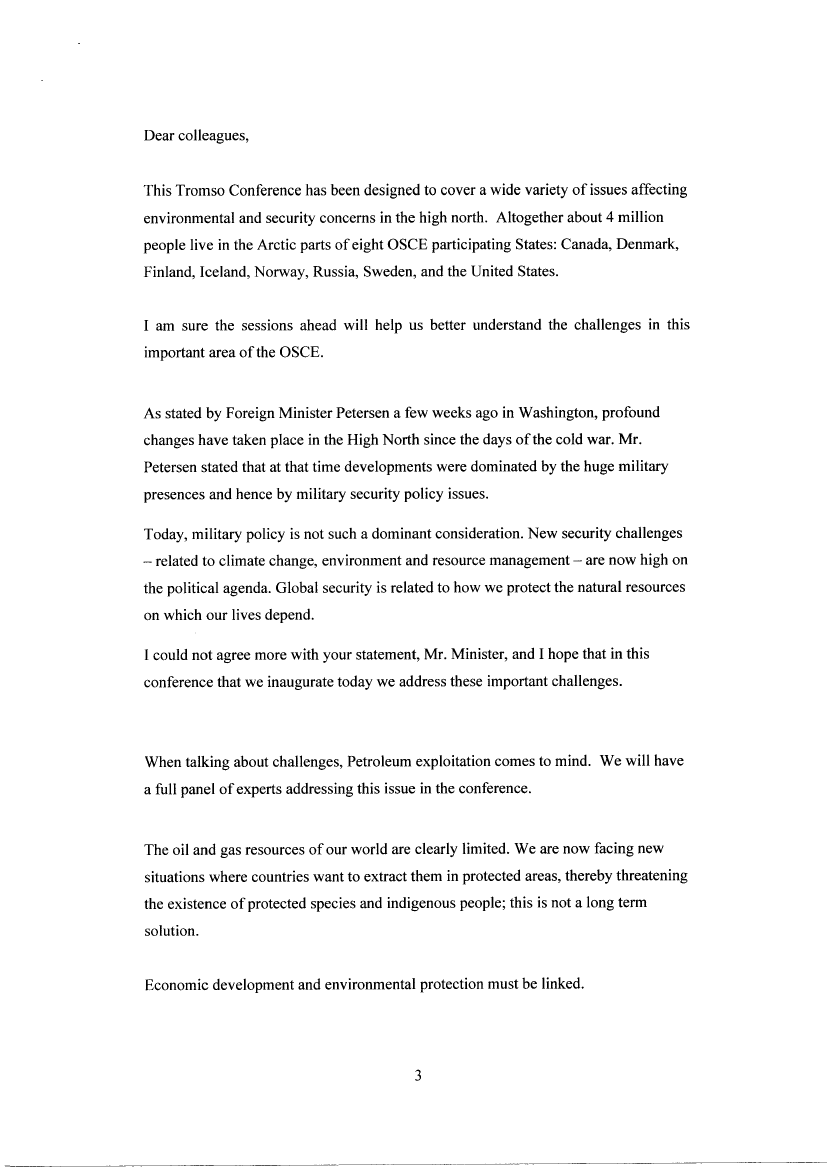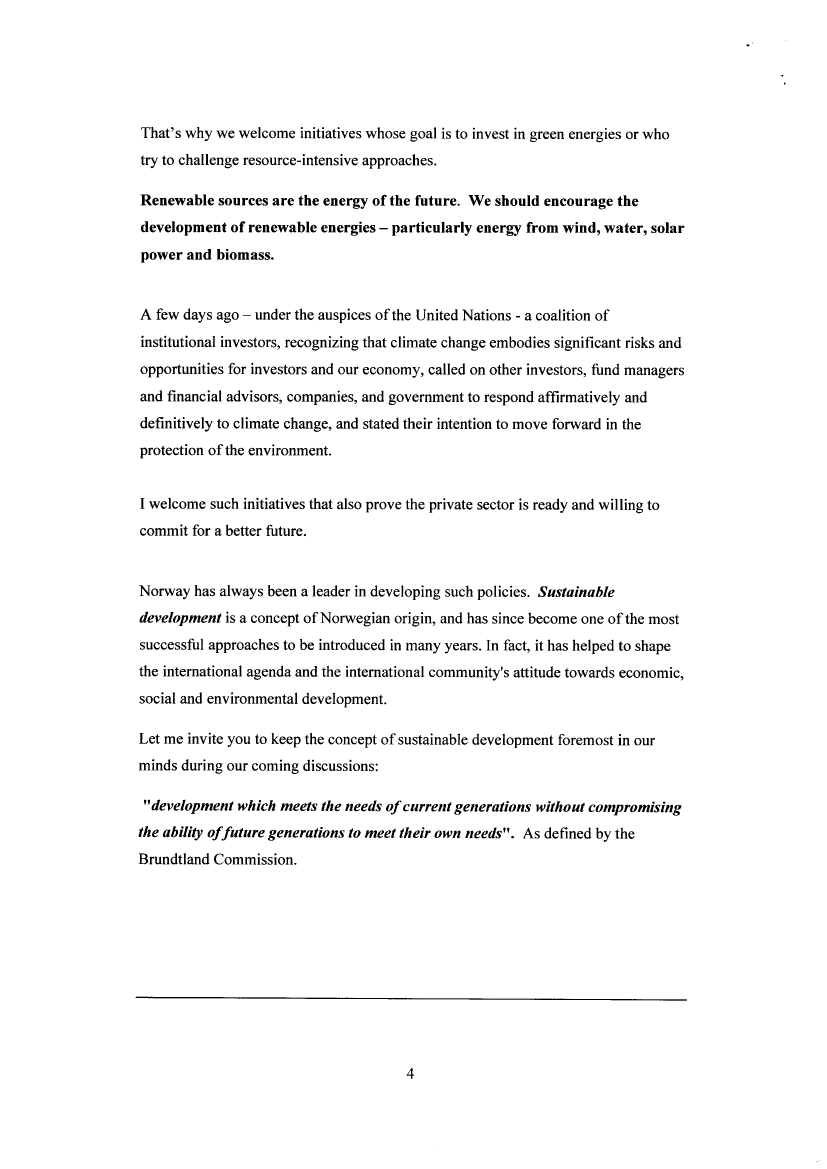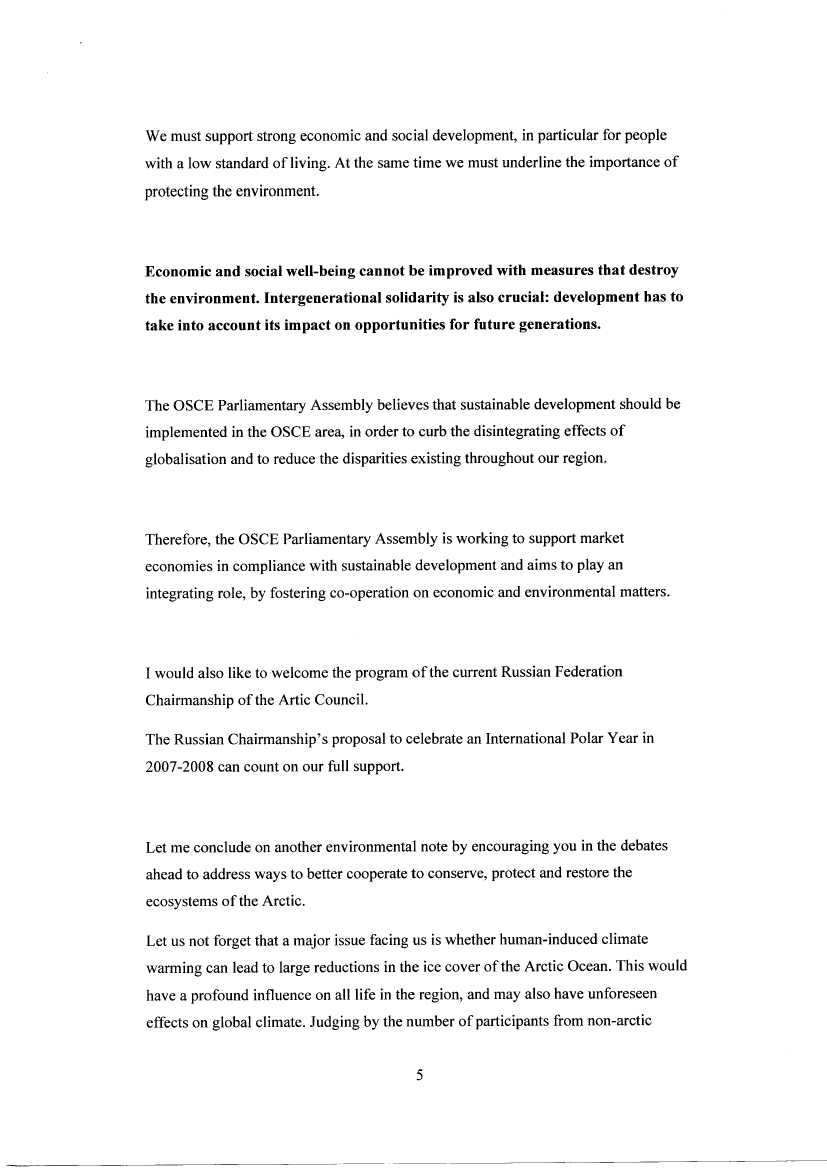OSCE's parlamentariske Forsamling 2004-05 (2. samling)
OSCE Alm.del Bilag 46
Offentligt
O
øø
e
P
PA
NIARY ASSF,
OSCE's parlamentariske Forsamling
(2. samling)
OSCE alm. del - Bilag 46
Offentligt
OSCE Parliamentary Assembly — 4th Sub-Regional
Conference
The High North: Environment, Security and Cooperation
12-13 May 2005
OPENING REMARKS
Congressman Alcee L. HASTINGS
President of the OSCE Parliamentary Assembly
OSCE, Alm.del - 2004-05 (2. samling) - Bilag 46: Opening remarks from Alcee Hastings on Conference on the High North: Environment, Security and Cooperation 12-13 May 2005
Mr. President,
Mr. Foreign Minister,
Distinguished colleagues,
Ladies and Gentlemen,
Let me begin by extending the collective gratitude of the OSCE Parliamentary
Assembly to our Norwegian hosts for their hospitality in welcoming all of us in this
beautiful city of Tromsoe for the Assembly's Fourth Sub-Regional Conference.
Your invitation, Mr. Speaker, reflects once more the traditional commitment of
Norway to the CSCE / OSCE process.
The Norwegian Chairmanship of the OSCE in 1999 succeeded in enhancing the
OSCE as a unique Organisation in our continent, devoted to preventive diplomacy,
conflict prevention and post-conflict rehabilitation.
The Chairman-in-Office at the time, Ambassador Knut Vollebaek, was also
instrumental in the development of relations between the OSCE and the OSCE
Parliamentary Assembly.
Distinguished Members,
This Fourth Sub-Regional Conference reflects the increasing contribution of the
OSCE Parliamentary Assembly in environmental and security matters.
The Assembly's Sub-regional conferences, held on a bi-annual basis, have been
designed to build and strengthen contacts between sub-regional organisations in order
to promote trade expansion and help implement programmes in fields as varied as
transportation, energy, environment, culture, and cross-border co-operation.
2
OSCE, Alm.del - 2004-05 (2. samling) - Bilag 46: Opening remarks from Alcee Hastings on Conference on the High North: Environment, Security and Cooperation 12-13 May 2005
Dear colleagues,
This Tromso Conference has been designed to cover a wide variety of issues affecting
environmental and security concerns in the high north. Altogether about 4 million
people live in the Arctic parts of eight OSCE participating States: Canada, Denmark,
Finland, Iceland, Norway, Russia, Sweden, and the United States.
I am sure the sessions ahead will help us better understand the challenges in this
important area of the OSCE.
As stated by Foreign Minister Petersen a few weeks ago in Washington, profound
changes have taken place in the High North since the days of the cold war. Mr.
Petersen stated that at that time developments were dominated by the huge military
presences and hence by military security policy issues.
Today, military policy is not such a dominant consideration. New security challenges
— related to climate change, environment and resource management — are now high on
the political agenda. Global security is related to how we protect the natural resources
on which our lives depend.
I could not agree more with your statement, Mr. Minister, and I hope that in this
conference that we inaugurate today we address these important challenges.
When talking about challenges, Petroleum exploitation comes to mind. We will have
a full panel of experts addressing this issue in the conference.
The oil and gas resources of our world are clearly limited. We are now facing new
situations where countries want to extract them in protected areas, thereby threatening
the existence of protected species and indigenous people; this is not a long term
solution.
Economic development and environmental protection must be linked.
3
OSCE, Alm.del - 2004-05 (2. samling) - Bilag 46: Opening remarks from Alcee Hastings on Conference on the High North: Environment, Security and Cooperation 12-13 May 2005
That's why we welcome initiatives whose goal is to invest in green energies or who
try to challenge resource-intensive approaches.
Renewable sources are the energy of the future. We should encourage the
development of renewable energies — particularly energy from wind, water, solar
power and biomass.
A few days ago — under the auspices of the United Nations - a coalition of
institutional investors, recognizing that climate change embodies significant risks and
opportunities for investors and our economy, called on other investors, fund managers
and financial advisors, companies, and government to respond affirmatively and
definitively to climate change, and stated their intention to move forward in the
protection of the environment.
I welcome such initiatives that also prove the private sector is ready and willing to
commit for a better future.
Norway has always been a leader in developing such policies. Sustainable
development is a concept of Norwegian origin, and has since become one of the most
successful approaches to be introduced in many years. In fact, it has helped to shape
the international agenda and the international community's attitude towards economic,
social and environmental development.
Let me invite you to keep the concept of sustainable development foremost in our
minds during our coming discussions:
"development which meets the needs of current generations without compromising
the ability offuture generations to meet their own needs". As defined by the
Brundtland Commission.
4
OSCE, Alm.del - 2004-05 (2. samling) - Bilag 46: Opening remarks from Alcee Hastings on Conference on the High North: Environment, Security and Cooperation 12-13 May 2005
We must support strong economic and social development, in particular for people
with a low standard of living. At the same time we must underline the importance of
protecting the environment.
Economic and social well-being cannot be improved with measures that destroy
the environment. Intergenerational solidarity is also crucial: development has to
take into account its impact on opportunities for future generations.
The OSCE Parliamentary Assembly believes that sustainable development should be
implemented in the OSCE area, in order to curb the disintegrating effects of
globalisation and to reduce the disparities existing throughout our region.
Therefore, the OSCE Parliamentary Assembly is working to support market
economies in compliance with sustainable development and aims to play an
integrating role, by fostering co-operation on economic and environmental matters.
I would also like to welcome the program of the current Russian Federation
Chairmanship of the Artic Council.
The Russian Chairmanship's proposal to celebrate an International Polar Year in
2007-2008 can count on our full support.
Let me conclude on another environmental note by encouraging you in the debates
ahead to address ways to better cooperate to conserve, protect and restore the
ecosystems of the Arctic.
Let us not forget that a major issue facing us is whether human-induced climate
warming can lead to large reductions in the ice cover of the Arctic Ocean. This would
have a profound influence on all life in the region, and may also have unforeseen
effects on global climate. Judging by the number of participants from non-arctic
5
OSCE, Alm.del - 2004-05 (2. samling) - Bilag 46: Opening remarks from Alcee Hastings on Conference on the High North: Environment, Security and Cooperation 12-13 May 2005
States at this Conference, I believe that this point is already accepted by many others
around the OSCE.
Again, Mr. Speaker thanks for this opportunity you have given us to discuss these
issues in these beautiful surroundings.
Thank you
6
